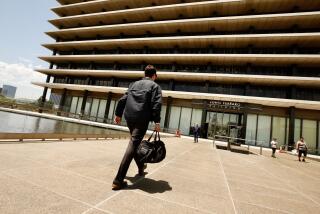Garcetti, Greuel step gingerly around city labor issues

- Share via
Los Angeles union leaders had hoped the presence of two liberal Democrats in the race for mayor would produce a robust defense of the value of government, government employees and the positive effects public sector pay and benefits have on the broader economy.
The realities of campaigning have largely precluded that, particularly in a city contending with persistent budget shortfalls and private-sector workers facing stagnant incomes, tax and fee increases, and a slow erosion of good-wage jobs.
On the campaign trail, Eric Garcetti and Wendy Greuel have struggled to be sympathetic, but not too embracing, of the defenses that unions have mounted of their members’ wages and benefits.
L.A. ELECTIONS 2013: Sign up for our email newsletter
But in one-on-one interviews with The Times, Garcetti and Greuel expressed an affinity for the idea that gains made by public employee unions yield wider economic benefits for the city.
“I think we should look at what it takes to have good family-wage jobs. That often gets lost when people want to pit one against another,” Greuel said. She added a favorite organized labor argument: “I think it’s the right kind of conversation to have — for all boats to rise.”
Garcetti said the first priority of government has to be providing services. But he cautioned against wholesale slashing of pay and benefits for city workers. “In tough times, people look around and see other people who they perceive to be better off,” Garcetti said, “but we shouldn’t make the mistake in those moments of racing to the bottom.”
FULL COVERAGE: L.A.’s race for mayor
Despite those sentiments, both Garcetti and Greuel have stepped carefully around public commitments to preserve wages and benefits. Both have signaled that they would be willing to ratchet benefits downward, if necessary.
Labor leaders had hopes, now mostly fleeting, that the mayor’s race would become a forum for a more expansive, supportive view of the public sector — and the dangers of pushing government austerity too far.
“That just pulls the rug out from under us as a society and an economy,” said Madeline Janis, national policy director at the Los Angeles Alliance for a New Economy, which has fought for private enterprise to pay a “living” wage.
“The place we have the remnants of a decent economy is in the public sector,” she said. “And we should be seeing that as the basis for a really healthy economy. Bringing us all up is not just the right thing to do, it’s the smart thing to do.”
But scrutiny of public employees reached a new pitch during the Great Recession, as workers in the private sector lost jobs, work hours and health coverage, often while seeing pension benefits cut or eliminated.
By 2011, only 18% of employees outside government had pension plans that guaranteed them a set benefit on retirement. That compared to 78% of local and state government workers nationally who still stood to receive defined-benefit payments after leaving their jobs.
Resentment over such discrepancies, what some have dubbed “pension envy,” partly helps explain the movement in several states to rein in the bargaining rights of public worker unions and to bring benefits down.
Kris Vosburgh, executive director of the Howard Jarvis Taxpayers Assn., said union stalwarts are “living in a fantasy land” to think that the city can continue to afford pensions and benefits higher than paid in the private sector.
“In order to execute a plan like theirs you have to have real money and we are running out of taxpayers to make those payments because they are fleeing the state,” Vosburgh said. “And the taxpayers are resentful because they are doing so poorly.”
Former Los Angeles Mayor Richard Riordan last year briefly pushed a ballot measure that would have replaced guaranteed pensions with 401k-style personal savings accounts. He abandoned the proposal last November, saying that he had gotten too late a start to gather the requisite signatures.
Union leaders longed for a different response to threats against their pay and pensions — workers rallying to sustain each others’ livelihoods against corporate and civic managers whose pay and benefits seldom seem to get the ax.
“It’s like there are two lifeboats in the ocean and there is a hole in one of them, the private sector,” said Bob Schoonover, president of SEIU Local 721, which represents 10,000 mostly blue-collar city employees. “Instead of pulling alongside and getting in the one good [government] boat you pull alongside and put a hole in the good boat too. Now we are going to sink both boats. And are we happy?”
The broader debate is complicated by a disagreement over how public and private sector compensation and benefits compare.
A May 2010 study by the Center for Economic and Policy Research found a mixed bag. Less skilled employees, such as parking lot attendants and security guards, tend to be paid more when they work for government, the study said. More skilled workers, like computer analysts and top-level managers, make more in the private sector.
But government jobs offer retirement benefits that “are considerably richer for long-term public sector employees,” said the same 2010 study, which focused on Los Angeles and two other California cities.
Maria Elena Durazo, leader of the Los Angeles County Federation of Labor, said she has grown weary of management and some politicians demonizing labor for City Hall’s financial ills. She argues that the average city worker receives $32,000 in retirement. “That’s not poverty for a family, but it’s certainly not middle-class,” she said. “This is very, very low on the middle-class or barely getting out of poverty.”
The website for the city’s civilian retirement system puts the average pension benefit for 12,000 current retirees about 40% higher than Durazo’s figure, or $45,648 annually. That’s more than double the poverty income level for a family of four in Los Angeles, as set by the U.S. Census Department. As of December, 546 civilian retirees, less than 5%, received $100,000 or more.
Durazo and Schoonover argue that city employees have received little credit for the financial burdens they have shouldered to help trim city deficits. Some workers, who once paid nothing up front toward their healthcare, now pay 10% of the cost. And pension contributions for employees have jumped to 11% of salary, nearly tripling the rate previously paid by some employees.
They also note that for their years of civil service, public workers don’t get Social Security benefits typically provided private sector workers. And they say the cash-strapped city would face new Social Security expenses — roughly 6% of each worker’s salary — if traditional fixed-benefit employee pensions were ended.
Garcetti and Greuel have sought the middle ground. Greuel says all employee pay and benefits should be “on the table” to address a budget deficit now estimated to be as high as $165 million. But she has declined to detail the sorts of changes she would demand from city employee unions, which have lined up behind her candidacy.
Garcetti has touted his work as City Council president and in reducing pension costs. He says he is prepared to do more, including pushing for all city employees to pay 10% of their healthcare costs, which could save the city $50 million a year, and creating healthy-living incentives, which he estimates could cut costs by another $20 million.
Garcetti, long a labor ally at City Hall, maintains the media has hyped the view that bloated public pension costs are the cause of budget shortfalls.
“What’s sexier is [to say:] ‘Cities are going bankrupt and pensions are causing it,’ ” Garcetti said. “It’s just been more of a bandwagon of ‘Oh my God, pensions are causing the great demise.’ ”
Union leaders say short-term savings from cuts in private and public worker wages and benefits will result in greater costs later, when workers may be forced to use public health facilities and even food stamps to make ends meet.
Greuel agrees, at least conceptually, saying that stable jobs with good benefits help reduce other public-sector expenses. “My whole record, what I have stood for,” she said, “is growing our middle class.”
More to Read
Sign up for Essential California
The most important California stories and recommendations in your inbox every morning.
You may occasionally receive promotional content from the Los Angeles Times.











